By Sarah Sherwood, NH Corps Member
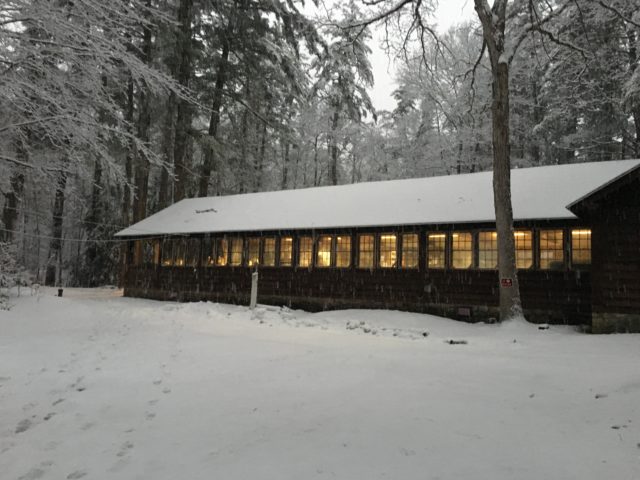
Have you ever had a roommate? Maybe you shared a room with a sibling when you were growing up or lived in a dorm in college. Most people I know have experienced the struggles and joys of sharing a living space – but no matter how massive your family is or how involved you were in university residential life, it probably doesn’t compare to life at Bear Brook State Park.
The SCA New Hampshire Corps is currently comprised of 27 members ranging from 21 to 27 years old. For many of us, our only experiences living outside of our parents’ homes was in college dorms, apartments, or houses. Ten short weeks ago, we had to adapt to a radically communal residential lifestyle.
To grasp the intensity of the community at Bear Brook, you need to understand our location. Our camp is situated in the heart of Bear Brook State Park, with a ten-minute drive just to reach the gate to the main road. In the winter, no other cars have access to the area. We live in rural winter cabins with no electricity or central heating; we have to stoke a woodstove regularly to enjoy a livable temperature inside. Although there are only four to eight residents in each cabin, we all share a main lodge that we use for essentially every activity besides sleeping. There is spotty cell phone service and satellite WiFi, which we limit to use for work-related activities. We share a fully-stocked industrial kitchen, three toilets, two showers, one landline, and one cable-less TV between the 27 of us. In these conditions, daily life becomes painful – if not completely unmanageable – without a high degree of cooperation.
Personal Needs and Preferences
Each of our members enters this program with a unique personal and professional history, possessions, living preferences, and essential needs. Attaining a fulfilling life at Bear Brook becomes a game of balancing singular comfort with overall symbiosis. For our material possessions such as books, changes of clothes, and valuables there are small cubbies set aside and labeled by name in a corner the lodge. Personal food is labeled before being placed on designated shelves in the walk-in fridge. Anything outside of these areas is in danger of disappearing into the void if left unsupervised for a lengthy period of time; we combat this by obsessively labeling every and all items we hope to have with us when we leave at the close of the program.
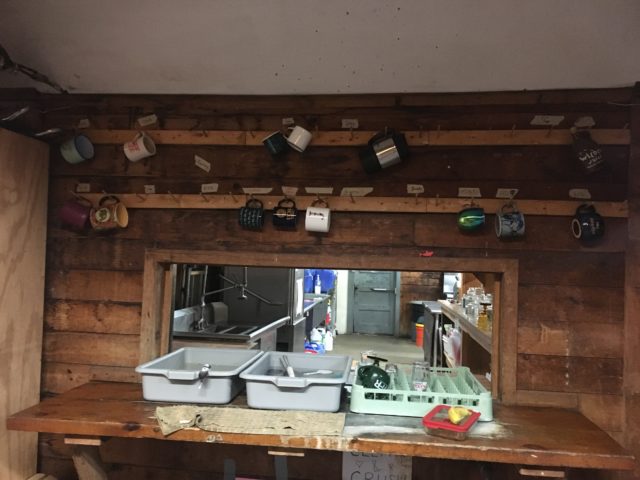
Daily routines also feel the consequences of cooperative living. With 27 people and two showers, staying clean is a matter of vigilantly monitoring when a shower opens and being prepared to hop in. I personally like to shower every other day right at 5pm when we conclude the work day so my hair has time to dry before the chilly nighttime walk back to my cabin; the showers are usually empty but I still make sure to have my change of clothes and shower toiletries ready to go. Laundry is regularly scheduled since our washing machine empties into a leach field that can only handle three loads of dirty water per day. Factor in one day a week to wash communal rags and mop heads, and that means we are allowed one load of laundry every ten days. Similarly, cooking demands a proactive approach to using dishes, utensils, and appliances and then cleaning them and evacuating the area efficiently to accommodate anyone else who may be waiting. At Bear Brook, laziness and distraction when using shared resources can have a ripple effect across the entire community.
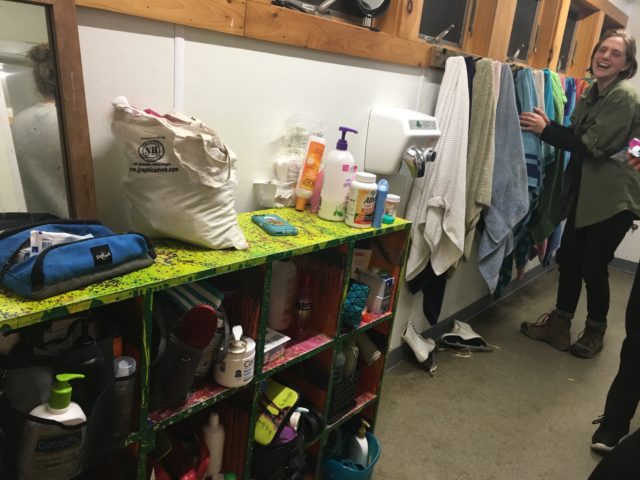
Chores
Not every responsibility is left to the mercy of each individual’s forethought. During the work week, cleaning of communal spaces is dictated by a rotating schedule. Each cabin is assigned to one of four daily chores: breakfast and lunch clean-up, dinner clean-up, dining hall, or bathrooms. On Mondays-Thursdays, we take turns cooking in groups of three for the entire Corps. This task takes several hours and lots of advance planning, so we’re grateful that each team only has to cook every second or third week. Every Monday, we undertake a deep clean of the whole camp known as REAM to minimize the wear and tear of daily use by several dozen people. Mondays also involve a “Community Meeting,” a several hour affair that provides a discussion space for proposed changes in rules or routines that may affect the group as a whole. Recent meetings have included spirited debates over the merits of different dining table arrangements, pleas to keep food waste out of the kitchen sink, and announcements about weekend outings, among myriad other topics. The gathering provides a safe space for the communication required to sustain our collaborative living situation to occur.

Recreation
Thus far, community living probably sounds like more of a burden than anything else. However, the arrangement isn’t all liability and no advantage. Sharing a work schedule and access to resources creates a uniquely communal recreational experience in the evenings and weekends. In our off-time, a visitor would likely observe at least one multiplayer card or board game. The sole TV becomes a common gathering point for nightly movies; a different crowd is drawn by each genre. If we want to watch current television shows, someone has to download it while they have access to WiFi in town and then connect their laptop to the TV screen to stream it. The process produces a shared experience of the show that is unmatched by watching Netflix alone in your room at home. Since only half of our members have cars at the park, trips into town are almost always group outings. We eat out, shop, travel, attend events, and explore together. To make the most of our short ten months at the program, we are separated into committees that are responsible for different aspects of community living outside of the work day. The Sustainability Committee organizes the recycling and compost, screens environmental documentaries, and provides workshops to create all-natural bath products or explore locally produced products such as tea. The Place-Based Committee writes a weekly newsletter about Bear Brook while the Outreach Committee posts weekend volunteering opportunities. The Outings Committee organizes trips out of the park for larger groups; to date we’ve gone laser-tagging, downhill skiing, night bowling, and on a private tour of a maple syrup producer. Every Tuesday a handful of regulars competes in Trivia Night at a local pub. When our budget prohibits costly outings, the Events Committee steps up to organize consistently ridiculous Friday shindigs that include home-cooked meal. In only two short months, they’ve put on an arm-wrestling competition, a thrift shop fashion show, and salsa dance lessons along with several “coffeehouse” open mic nights. Attendance is always high and fun is guaranteed.
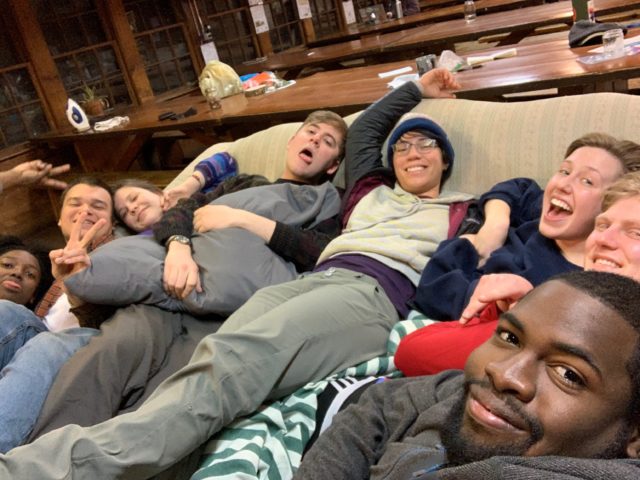
The immediate and constant proximity of your 26 peers creates an organic camaraderie that I personally have never experienced and could not have anticipated. We are truly each other’s closest allies both in and outside of camp. When we enter the public sphere, we bond further over our noticeable woodstove aroma and excitement about cell phone service and WiFi. Our staff warned us from the beginning that we would leave Bear Brook feeling like we had found a family, but we’ve already become each other’s surrogate siblings just two months in. The challenge of working and living as a unified entity while celebrating our individual differences will make us better citizens when we leave the Corps, and I personally am extremely grateful for this growing experience.

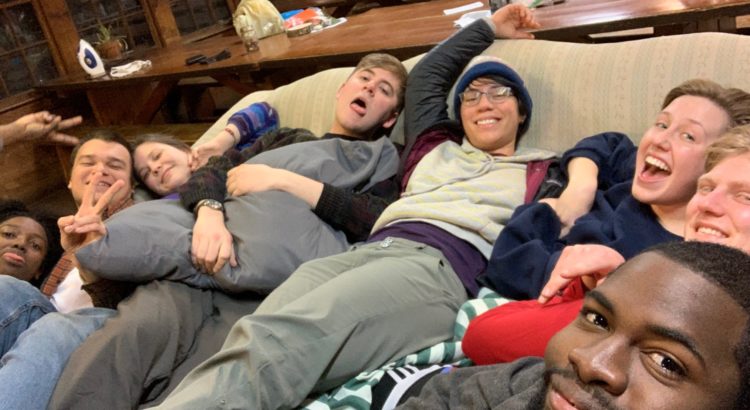
I am so happy to read about your experiences. I have fond memories of attending Bear Hill 4-H Camp
for many summers in the 1950’s. My two sons later attended camp there followed by my grandchildren.
We were very sad when the camp closed.
I hope you will publish more about your stay and tell us about some of the work you are doing there.
Enjoy your stay at camp and in NH.
Thank you for sharing your insight into what is life like there. I hadn’t realized what a interesting, organized, and teamwork driven opportunity this was! Eager to hear more!
One of the best experiences I’ve had was Bear Brook class of 2013! Thanks for describing in such detail and bringing back some great memories!